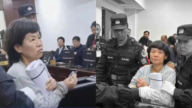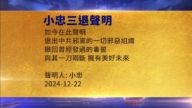【新唐人2011年7月29日訊】北京市區最近正在加強對酒吧、餐廳、旅館和書店等公共場所的無線上網管制。新出臺的規定要求這些店家必須安裝網絡監控軟件,否則為顧客免費使用的無線區域網絡Wi-Fi將被停用。許多大陸博客作家認為,網路控制是對言論自由和信息傳播自由權利的侵犯。
在北京東城區一家咖啡廳的門前,貼著一張警方的通知,上面寫著《關於開展非經營上網服務場所依法落實安全技術保護措施的通知》。
文件通知轄區內的咖啡店、酒店、小酒吧等場所,使用無線上網的地方要安裝一個“安全監控”軟體才能上網,否則為顧客免費用的WiFi將被停用。
《紐約時報》報導,北京公安部門要求業主,必須安裝一套價格約為兩萬元人民幣的軟件。這款軟件能夠讓公安局了解這些在餐館、咖啡廳或者私人學校登錄上網者的身份,並且監察他們的網絡活動。如果不按照規定,提供無約束網絡服務的商家,將會被罰款1.5萬元,甚至有被吊銷營業執照的可能性。
警方在通告中表示,有不法份子利用網際網路進行網路詐騙、販毒、賭博、散步有害信息、傳播電腦病毒等案件日益嚴重,損害了國家和群眾利益,也使一些企業蒙受經濟損失,登記身份就是保障互聯網的安全。對此,北京律師鄔宏威表示,這樣是不可能保障網路安全的,只是增加對言論的管控。
北京市海銘律師事務所鄔宏威:「他這個控制呢,就是加強對人的言論自由的問題,和社會管理的問題。」
大陸著名網絡公民記者周曙光也表示,這只是一個當局用來打壓言論自由的藉口。
中國網絡公民記者周曙光:「這是一個藉口,但是我覺得對在中國來說,更重大的是用這個方法來打壓言論自由,然後迫害那些在網絡上的維權者,或者是其他政治抗議者,因為我覺得登記每一個上網者的訊息,和那個防火長城檢查系統的目標是一致的。」
資深博客莫之許對《自由亞洲電臺》表示,雖然一般人未必受到干擾,但行政當局介入通訊自由值得商榷。
資深博客莫之許:「對個人信息的掌握是需要討論,因為通訊是個人空間,我們的憲法也是保障通訊自由,新趨勢下比如說QQ,各種交流軟體,也算是統一的通訊,所以政府若要介入這方面,我覺得需要論證一下。」
據了解,許多擁有筆記型電腦和ipad的大學生或外派人員,還有那些熟悉內情的網民,他們在網吧會通過某種匿名方式來上網。藉由「微博」一次可以發表140個文字的方式,相互交流信息,或討論、複製和轉發信息。
像這次浙江溫州發生動車追撞事故,大陸網友紛紛透過「微博」發起營救行動,23號20點47分,一條求救的「微博」發出後,迅速被轉發9萬4125次。
也正是這樣的一群人組成了影響力極大的「微博前線人員」,革命性的改變了中國人信息交流傳遞的方式,是否因此讓北京公安當局感受了互聯網迅速傳遞的作用,而加強網控。
有輿論認為,中國是世界上網控最嚴格的國家之一。據不完全統計,去年中共當局封堵了一百多萬個網站,其中包括臉書、推特、YOUTUBE和EVITE等在很多國家廣泛使用的網站。
新唐人記者林莉、黃容、孫寧採訪報導。
Beijing Monitors Public Wi-Fi
Beijing recently increased surveillance on internet cafes,
restaurants, hotels and bookstores』 public Wi-Fi networks.
The new regulations require these public Wi-Fi networks
to install a monitoring software.
Otherwise, their public Wi-Fi will be disabled.
Many Chinese bloggers believe the network monitoring
is a violation of freedom of speech and communication.
Police has posted a notice in an internet cafe in east Beijing.
It reads, “None-commercial Internet establishments
must implement security protection measures.”
The notice informs all coffee shops, bars, etc. in the district
that to provide Wi-Fi, they must install a “monitoring” software.
Otherwise, their free Wi-Fi for customers will be stopped.
As per New York Times, Beijing Public Security Bureau
demands shop owners to install a software that costs
RMB 20,000 [about USD 3,100].
The software will allow the police to identify and monitor
everyone, who goes online using these networks.
If the shops do not comply and still offer free Wi-Fi,
they might be fined RMB 15,000 [USD 2,300],
or have their business licenses revoked.
Police said in the notice, criminals are using the Internet
to carry out scams, drug trafficking, gambling and
to spread vicious information and virus.
All these harm the national and public interest.
And various businesses suffered economic loses.
Therefore, user registration is to protect the Internet security.
However, Beijing-based lawyer Wu Hongwei believes that
this won』t ensure Internet security other than monitor it.
Lawyer Wu Hong Wei: This regulation is an issue of
freedom of speech and management of the society.
China』s Internet citizen reporter Zhou Shuguang also thinks
this is just an excuse to suppress freedom of speech.
Citizen reporter Zhou Shuguang: This is just an excuse.
In China, this will be used to suppress speech,
then to persecute vocal human rights defenders
and other political dissidents.
Internet user registration goes hand in hand with
the ultimate goal of the Great Firewall of China.”
Veteran blogger Mo Zhixu told Radio Free Asia that
it might not affect ordinary netizens.
However, it』s debatable to have the administration
getting into communications.
Blogger Mo Zhixu: We need some discussion on
having access to personal information.
Communication is personal information.
Our constitution also protects freedom of communication.
Software such as QQ, chatting software, etc,
are a form of communication.
If the government wants to intervene,
they need good reasoning.
Many college students and expatriates using notebooks and
iPads, as well as netizens that receive insider information,
often go online anonymously in internet cafes.
Using micro-blog』s 140-word limitation,
they communicate, discuss, copy and transfer information.
For example, of the recent high-speed train rear-end collision,
many netizens initiated rescue efforts on micro-blogs.
On July 23, at 8:47p.m., a call to help was micro-blogged,
and was then forwarded 94,125 times.
These people formed a “Micro-blog Frontier,”
and revolutionized Chinese people』s communication methods.
Maybe the speed of communication is what worries
the Beijing police, who therefore pushes the regulation.
Some public opinion expresses that China
is one of the most strictest in her internet control.
According to incomplete statistics, the communist regime
blocked over 1 million websites in 2010,
including Facebook, Twitter, Youtube, Evite
and other popular overseas websites.
NTD reporters Lin Li, Huang Rong






























